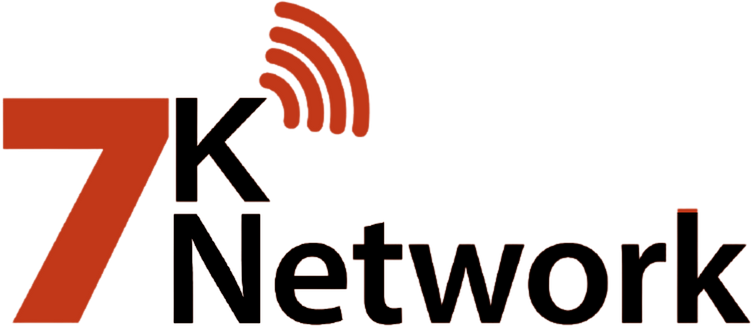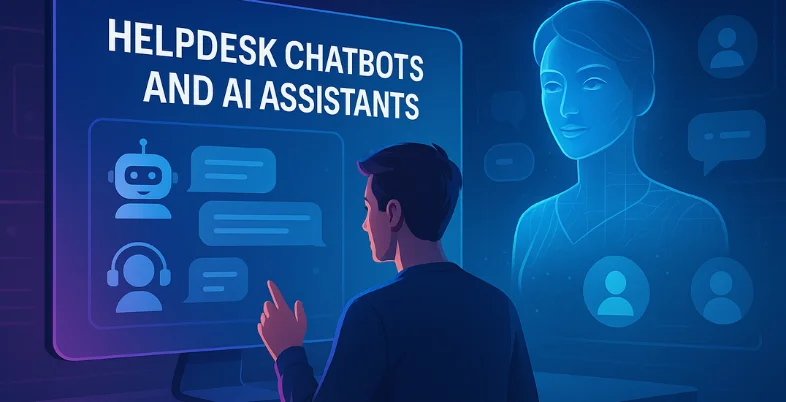In recent years, there has been a significant change in the way companies provide customer service. Businesses are expected to be responsive 24/7, resolve queries instantly, and provide personalized support at scale.
Enter Helpdesk Chatbots and AI Assistants, two transformative technologies redefining how companies handle customer interactions. According to a 2025 Gartner report, over 70% of customer interactions are now managed by AI-driven solutions, up from 15% in 2018.
Whether you run a small startup or a multinational enterprise, integrating AI-powered helpdesk chatbots can significantly enhance your support system, reduce operational costs, and improve customer satisfaction.
What are Helpdesk Chatbots?
Helpdesk chatbots are AI-powered virtual agents that simulate human conversations to assist users with support-related queries. These bots can live on websites, mobile apps, social media platforms, or messaging apps and are designed to provide immediate responses, route tickets, or solve basic issues without human intervention.
Key Capabilities of Helpdesk Chatbots:
- 24/7 customer support
- Handling FAQs and tier-1 queries
- Ticket creation and routing
- Multilingual support
- Real-time data access and integration with CRMs
What are AI Assistants?
AI Assistants are more advanced, context-aware virtual agents that leverage Natural Language Processing (NLP), Machine Learning (ML), and predictive analytics to provide a human-like conversational experience. Unlike basic chatbots, AI assistants can understand intent, learn from interactions, and automate complex workflows.
Common Uses of AI Assistants in Helpdesk:
- Personalized customer interaction
- Predictive issue resolution
- Integration with IT service management (ITSM) tools
- Intelligent task automation and escalation
- Voice command-based interaction (for smart devices)
Benefits of Helpdesk Chatbots and AI Assistants
Integrating these technologies into your customer support ecosystem yields significant advantages:
- 1. Improved Response Time:- AI chatbots can instantly respond to thousands of queries simultaneously, drastically reducing waiting times.
- 2. Reduced Operational Costs:- Businesses can cut customer support costs by up to 30% by automating repetitive tasks (IBM, 2024).
- 3. 24/7 Availability:- Unlike human agents, bots don’t need breaks, vacations, or shifts, ensuring round-the-clock support.
- 4. Scalability:- AI assistants can effortlessly handle sudden spikes in query volume during product launches or sales campaigns.
- 5. Consistency:-Bots provide consistent answers, eliminating the variability seen in human interactions.
- 6. Multilingual Support:- AI-driven bots can interact in over 100 languages, improving support for global customers.
Use Cases of Helpdesk Chatbots in 2025
- Handle order tracking, returns, product suggestions, and payments in e-commerce.
- Assist with booking, reminders, and insurance queries in healthcare.
- Support account management, fraud alerts, and transactions in banking.
- Provide course info, enrollment help, and exam schedules in education.
- Automate tickets, password resets, and tech issues in IT and SaaS.
Popular Helpdesk Chatbots and AI Assistants
Here are some top-performing AI helpdesk solutions:
1. Zendesk AI
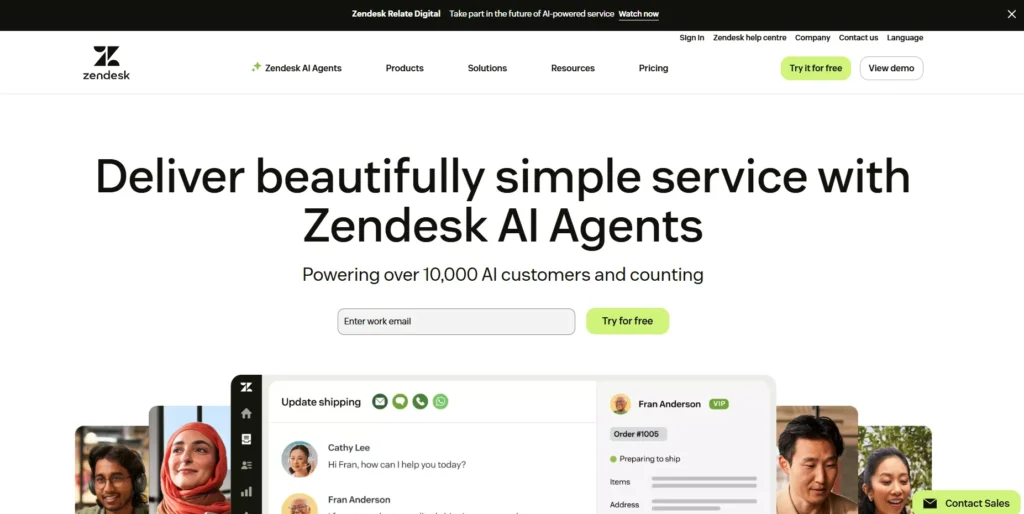
Website: www.zendesk.com
Zendesk AI is a powerful extension of the Zendesk Suite, providing AI capabilities like intelligent triaging, agent-assist, and workflow automation. The AI automatically tags and routes support tickets based on urgency and context, helping teams respond faster and more accurately.
It pulls insights from historical interactions to suggest next-best actions to agents and helps customers self-serve through smart bots integrated with your knowledge base. With scalable features, it’s ideal for enterprises with complex support needs.
Key Features:
- AI-powered ticket routing and prioritization
- Predictive insights and contextual agent suggestions
- Bot integration with help center content
- Workflow automation for faster resolution
Best For: Large companies using Zendesk for omnichannel customer service.
2. Intercom Fin AI
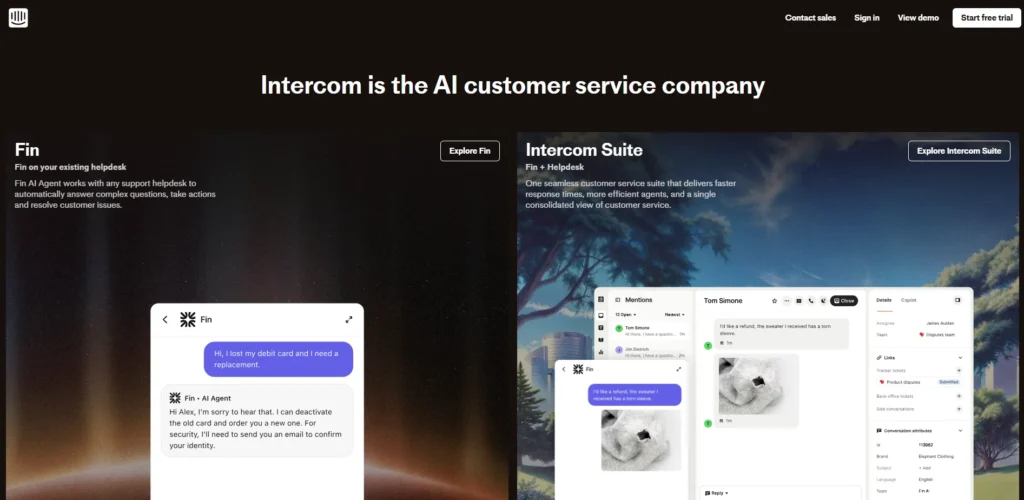
Website: www.intercom.com
Fin by Intercom is an advanced AI chatbot built on OpenAI’s GPT architecture that delivers human-like responses based on your existing support content. It’s designed to automate up to 50% of customer inquiries instantly, without losing the tone and voice of your brand.
Fin understands context deeply and can escalate to live agents when needed. It also continuously learns from real customer conversations to improve over time. Built into Intercom’s suite, it’s fast, efficient, and highly reliable.
Key Features:
- GPT-powered smart answers from help docs
- Seamless live agent handover
- Works across chat, email, and in-app support
- Analytics on accuracy and resolution rates
Best For: SaaS and tech startups needing scalable, branded support automation.
3. Freshchat by Freshworks
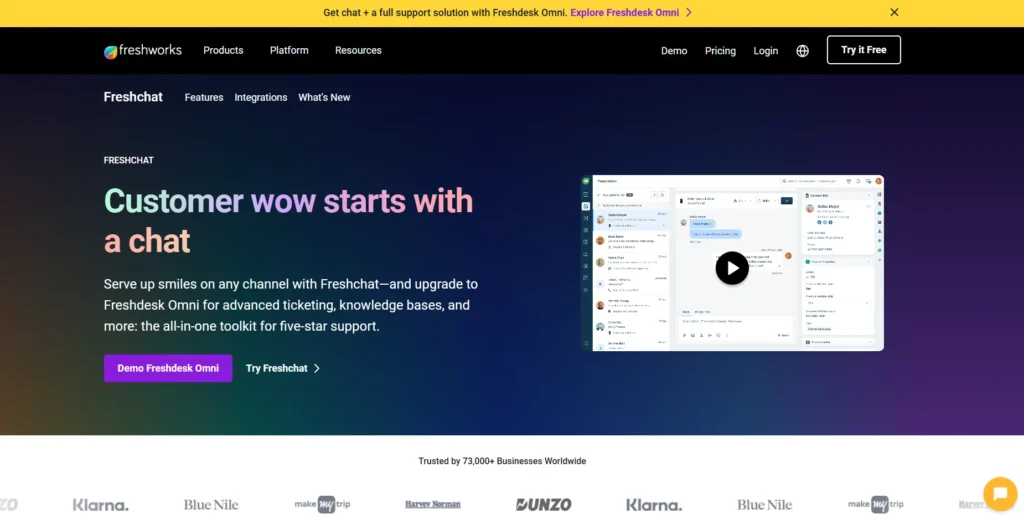
Website: www.freshworks.com/freshchat
Freshchat combines modern messaging with AI to deliver personalized conversations at scale. As a powerful customer support tool, its Freddy AI chatbot helps automate FAQs, engage leads, and provide contextual responses from your knowledge base.
Freshchat also supports proactive messaging, omnichannel chat, and behavioral targeting to guide users toward quicker resolution. With its tight integration into Freshdesk and Freshsales, it connects customer support, sales, and marketing into one seamless experience.
Key Features:
- Freddy AI bot for ticket deflection
- Behavioral targeting and triggered campaigns
- Omnichannel support (web, mobile, WhatsApp)
- Unified inbox for sales and support teams
Best For: Mid-sized businesses and support teams using Freshworks products.
4. Tidio
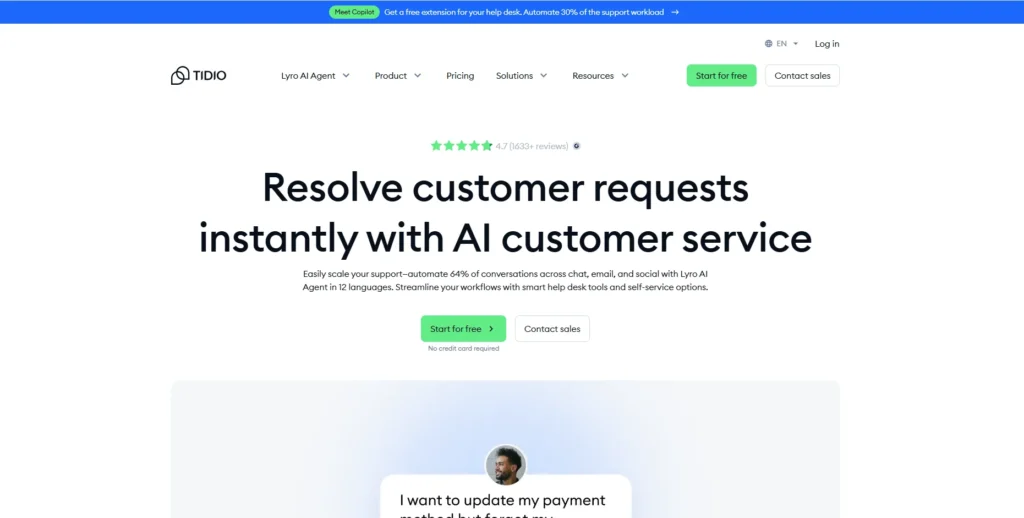
Website: www.tidio.com
Tidio is a user-friendly chatbot platform tailored for small businesses and e-commerce stores. It offers a mix of live chat, automation, and the Lyro AI assistant, which can manage customer conversations using natural language processing.
Tidio also comes with predesigned chatbot templates for common support scenarios, making it easy to set up even for non-tech users. It integrates seamlessly with Shopify, WordPress, and WooCommerce, making it a go-to solution for online retailers.
Key Features:
- AI-powered Lyro assistant for automation
- 35+ prebuilt chatbot templates
- Easy integration with eCommerce platforms
- Visual chatbot builder for beginners
Best For: Small eCommerce stores looking to boost customer support and sales.
5. Drift
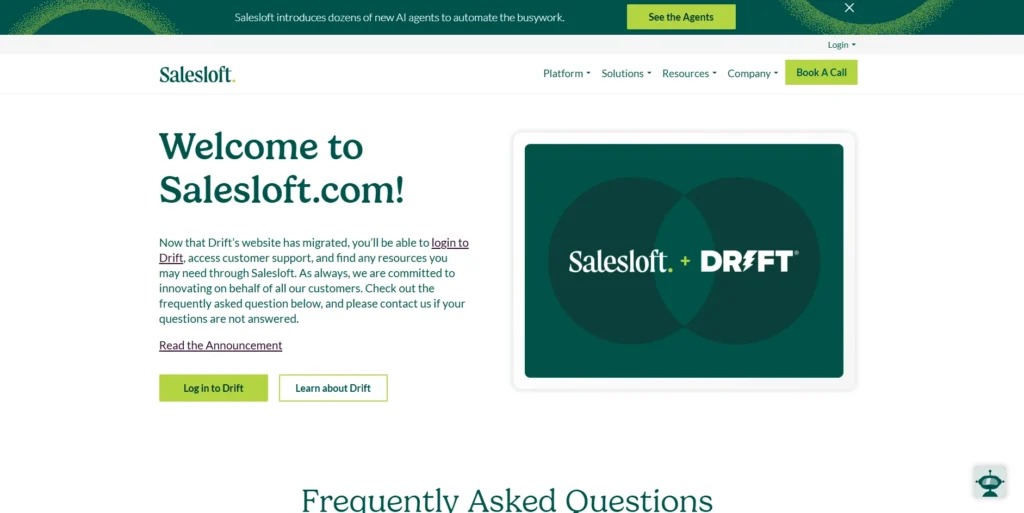
Website: www.drift.com
Drift is a conversational AI platform that bridges marketing and customer service through real-time messaging. The AI assistant automates lead qualification, books meetings, and provides instant responses to sales inquiries.
Drift is known for its robust targeting engine that can initiate chats with high-value website visitors. The platform also connects with CRM software like HubSpot and Salesforce, enabling seamless data flow between support, marketing, and sales.
Key Features:
- Conversational lead generation bot
- Real-time visitor targeting and engagement
- CRM and marketing automation integrations
- Meeting booking and qualification workflows
Best For: B2B companies focused on lead gen and revenue acceleration.
6. Salesloft
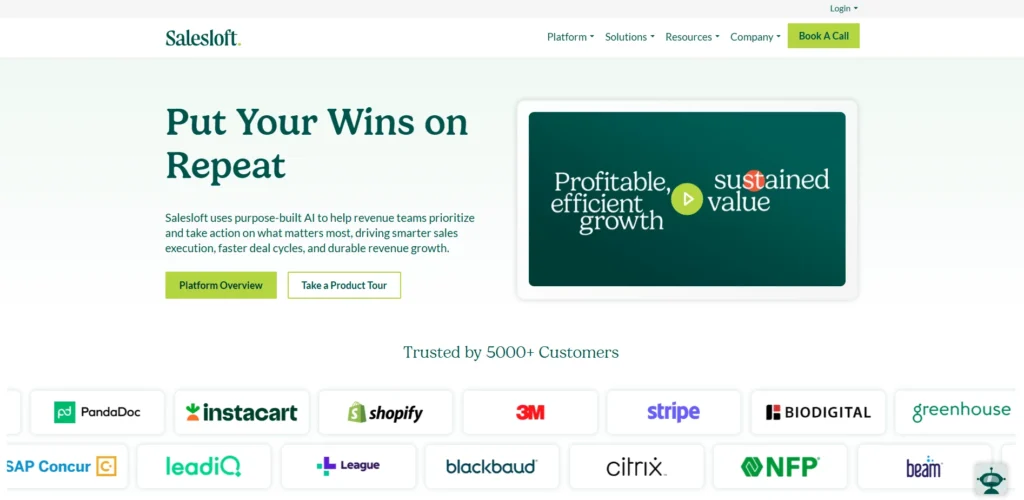
Salesloft is a leading AI-driven sales engagement platform that also offers intelligent helpdesk chatbot capabilities for sales teams. In 2025, it continues to empower businesses to build better customer relationships by combining automated workflows, email tracking tools, live chat, and AI-powered assistance.
With features tailored to streamline sales conversations, follow-ups, and deal progression, Salesloft enhances productivity while ensuring timely, personalized customer engagement. Its AI assistant capabilities are especially effective in handling repetitive queries, capturing sales intent, and supporting lead nurturing.
Key Features:
- AI-enhanced chatbot for sales support and lead engagement
- Multi-channel outreach (email, phone, LinkedIn, live chat)
- Automated sales cadences and conversation tracking
- Real-time analytics and performance dashboards
- CRM connections to Microsoft Dynamics, Salesforce, and other platforms
Best For:
Sales organizations, account executives, and B2B companies aiming to boost pipeline efficiency and automate customer communications.
7. Ada
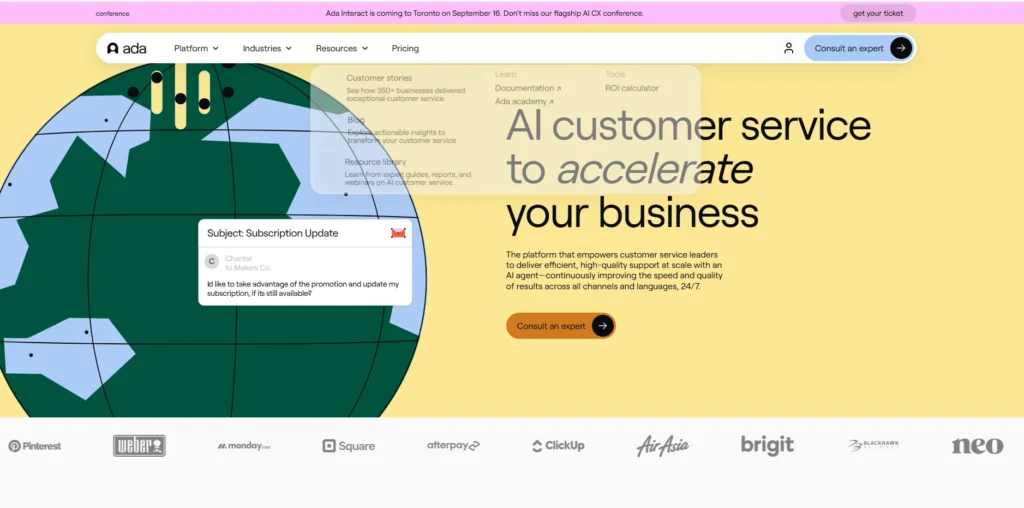
Website: www.ada.cx
Ada is an AI-powered support automation platform tailored for high-growth and enterprise teams. It enables brands to offer 24/7 support through no-code bots that handle inquiries across chat, email, and messaging apps.
Ada’s conversational engine identifies intent, routes queries smartly, and delivers answers instantly. Its focus on personalization and brand control makes it ideal for companies looking to scale without sacrificing quality.
Key Features:
- Intent recognition and NLP engine
- Omnichannel support (chat, SMS, WhatsApp)
- Easy-to-deploy no-code builder
- Integration with Salesforce, Zendesk, and more
Best For: Enterprises requiring scalable automation with brand consistency.
8. LivePerson AI
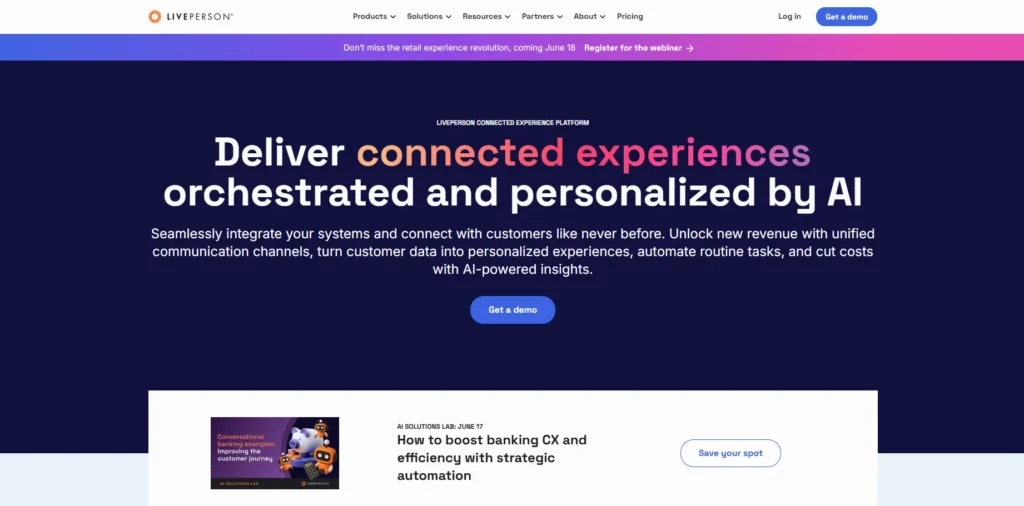
Website: www.liveperson.com
LivePerson’s AI solutions power messaging and voice bots that engage customers across SMS, WhatsApp, Facebook Messenger, and more. Its AI is built to understand intent and emotions, enabling more empathetic and effective interactions.
The platform supports both automated and live chat workflows, allowing smooth transitions between bots and agents. Trusted by global brands, LivePerson is used in finance, retail, telecom, and travel sectors.
Key Features:
- Emotion-aware AI and sentiment analysis
- Voice AI for call center automation
- Messaging automation across all major channels
- Enterprise security and compliance
Best For: Large enterprises needing secure, multi-channel AI engagement.
9. Kore.ai
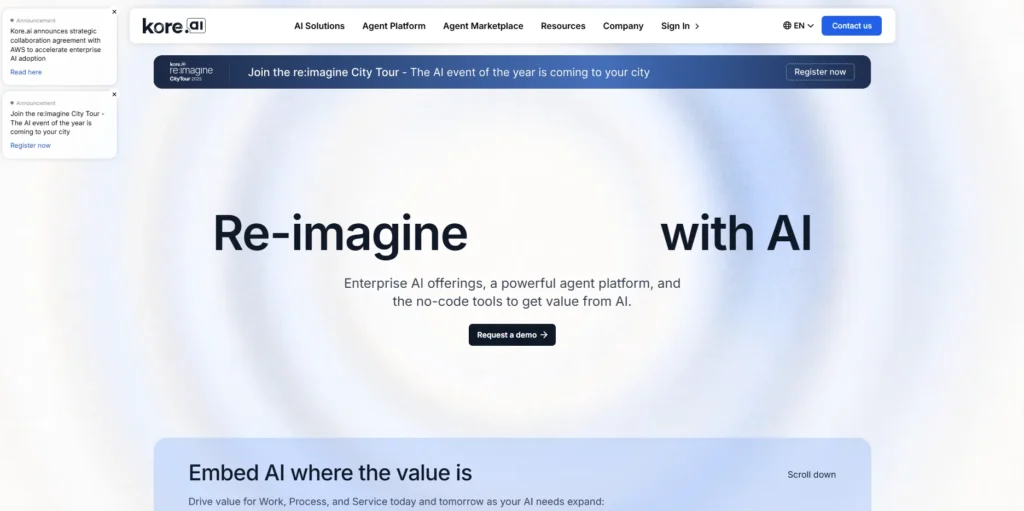
Website: www.kore.ai
Kore.ai is a sophisticated platform offering end-to-end automation for voice and chat interactions across customer service, HR, and IT. It allows enterprises to create smart assistants using a drag-and-drop builder or advanced NLU training.
Kore.ai supports custom workflows, multilingual conversations, and can be deployed on-premise or in the cloud. It’s designed for regulated industries like banking, insurance, and healthcare.
Key Features:
- Visual and code-based bot creation
- Multilingual support and voice bots
- Industry-specific virtual assistant templates
- Flexible deployment (on-prem or cloud)
Best For: Enterprises in regulated industries needing secure, customizable automation.
10. Botpress
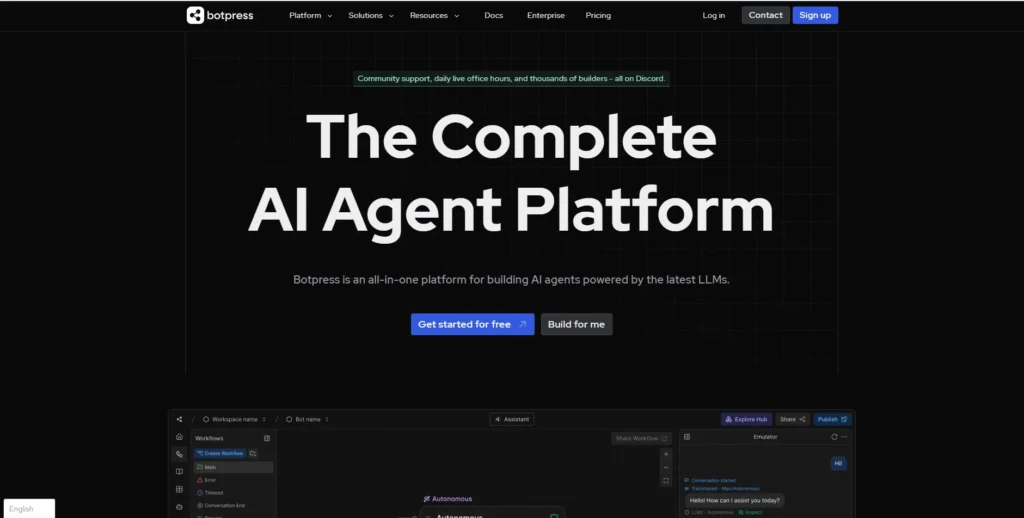
Website: www.botpress.com
Botpress is a developer-focused, open-source conversational AI platform designed for teams that want full control over chatbot architecture. It supports advanced NLU, conversation flow design, and full customization through modular components.
You can host it on your own servers, integrate with any third-party systems, and extend functionality via code. Botpress is ideal for businesses with privacy concerns or unique integration requirements.
Key Features:
- Open-source and fully customizable
- Visual conversation flow editor
- NLU engine with training and intent mapping
- Self-hosting for maximum data control
Best For: Developers and enterprises wanting privacy-focused, custom chatbot solutions.
Key Features to Look for in Helpdesk Chatbots
If you’re considering investing in a helpdesk chatbot, prioritize these features:
- Omnichannel support (web, mobile, WhatsApp, etc.)
- Customizable workflows and logic
- Integration with ticketing and CRM systems
- Advanced analytics and reporting
- AI training and feedback loops
- GDPR and data compliance
AI Assistants vs Traditional Chatbots: What’s the Difference?
| Feature | Traditional Chatbots | AI Assistants |
| Language Understanding | Rule-based | NLP & ML-based |
| Learning Capability | No | Yes |
| Personalization | Limited | High |
| Integration | Basic | Deep (CRMs, ERPs) |
| Use Case Complexity | Low | Medium to High |
AI assistants offer far greater sophistication and scalability, making them a smart long-term investment.
Future of Helpdesk Chatbots and AI Assistants
The future of AI in helpdesk support looks promising, driven by innovations in Generative AI, Voice AI, and emotional intelligence. Beyond 2025, we can anticipate:
- Emotion-aware bots that adjust tone based on user mood
- Voice-enabled AI agents integrated with smart devices
- Fully autonomous support agents with self-learning capabilities
According to Statista, the global chatbot market is projected to reach $27.6 billion by 2030, growing at a CAGR of 23.9%. AI assistants will be the backbone of future customer service.
Conclusion
Helpdesk chatbots and AI assistants are reshaping the landscape of customer support, offering faster, smarter, and more efficient solutions to common service challenges. By handling routine queries, providing 24/7 availability, and delivering consistent responses, these technologies significantly reduce workload on human agents and improve response times. Businesses benefit from enhanced productivity, cost savings, and increased customer satisfaction. Moreover, with advancements in natural language processing and machine learning, AI assistants are becoming more intuitive, capable of understanding context and emotions to deliver personalized support experiences. As digital transformation continues across industries, integrating helpdesk chatbots and AI-driven tools is no longer optional but essential for companies aiming to stay competitive. Their ability to scale effortlessly, learn continuously, and support diverse platforms ensures they will play a central role in the future of customer service. Embracing these technologies today sets the foundation for more agile, responsive, and customer-centric operations tomorrow.
FAQs
Q1: What is the difference between a chatbot and an AI assistant?
A: A chatbot typically follows rules and scripts, while an AI assistant understands context, learns over time, and handles complex tasks.
Q2: Are helpdesk chatbots suitable for small businesses?
A: Yes, many platforms offer affordable plans tailored for startups and SMBs.
Q3: Can AI assistants handle voice interactions?
A: Yes, advanced AI assistants support voice-based queries through smart devices or apps.
Q4: Are helpdesk chatbots secure?
A: Yes, if built on secure platforms with encryption and data compliance (e.g., GDPR).
Q5: Which is the best AI chatbot for customer support?
A: Tools like Zendesk AI, Intercom Fin, and Freshchat are among the top-rated in 2025.
